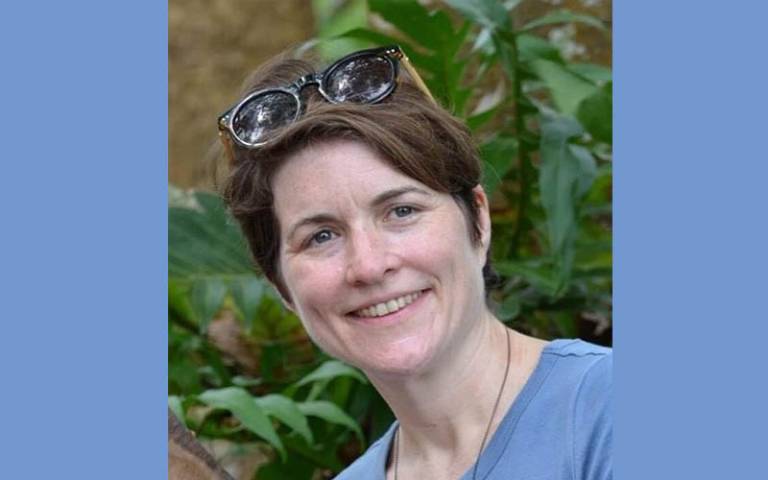Spotlight on... Cathy Holloway
5 June 2019
This week the spotlight is on Cathy Holloway, Associate Professor, UCLIC & Academic Director, Global Disability Innovation (GDI) Hub

What is your role and what does it involve?
I help to lead new thinking and create knowledge in the area of Global Disability Innovation, specifically through investigating, developing and creating the new undiscipline of disability interaction (the antithesis to the traditional academic ‘discipline’). To do this, I work closely with the GDI hub and UCL Interaction Centre (UCLIC) academic teams in developing new research and using this to drive our teaching. The GDI Hub team extends across UCL and our founding partners who are all helping to create new learning methods and spaces on the Queen Elizabeth Olympic Park and to our growing global partnerships. My role is therefore a dream job and multi-layered. Sometimes a day can easily consist of a meeting on global agenda-setting for assistive technology with UN agencies, international NGOs and Donors; a detailed budget meeting for GDI; followed by an afternoon of marking and lecture preparation!
How long have you been at UCL and what was your previous role?
I have been at UCL since 2006. I started as a PhD student based between the Royal National Orthopaedic Hospital and Civil, Environmental & Geomatic Engineering (CEGE). I then managed the Pedestrian Accessibility Movement Environment Laboratory (PAMELA) and worked for and with Professor Nick Tyler to direct the research of the Accessibility Research Group, before becoming a lecturer in Accessibility Engineering. In 2012 I bade a fond farewell to CEGE to join Computer Science and UCLIC where I went on to establish the GDI Hub and become an Associate Professor.
What working achievement or initiative are you most proud of?
The GDI Hub. The fact we managed to establish it. The fact it is different – both an academic centre and a not for profit company. The fact we did it in partnership with great people who all worked exceptionally hard, sometimes with difficult dynamics – to help develop and move forward a vision we all believed in: to accelerate disability innovation for a fairer world. Finally, within the GDI Hub I am most proud of the new MSc Disability, Design & Innovation. I believe it will create a new generation of people able to develop a better, fairer future and in doing so will have impact that will I believe outlive any other initiative we manage to achieve.
Tell us about a project you are working on now which is top of your to-do list?
My to-do list is a scary place…be warned. Top of it is the AT2030 programme and specifically within this large (£20m) programme, the sub-programmes on Innovation and Research. AT2030 is about improving the access to assistive technology (AT) for the 900 million disabled and older people who don’t have it – mostly in the Global South. We are tasked with reaching three million people and establishing a new ecosystem of innovation in AT which will develop 100 new start-ups. At the top of my to-do list is always a focus on how we will ensure a lasting legacy from this programme which in turn ensures new and better realities for people who need assistive technology.
What is your favourite album, film and novel?
This is hard.
Album – Wish you were Here, Pink Floyd
Novel – Harry Potter and the Prisoner of Azkaban by JK Rowling or Oryx & Crake by Margret Atwood
Film – I can’t decide. I love film. Can I instead pick a favourite film festival – BFI Flare.
What is your favourite joke (pre-watershed)?
I never remember jokes, sorry.
Who would be your dream dinner guests?
Mary Robinson, Ghandi, Malcolm X, Emily Pankhurst, and Dumbledore if he were real.
I’d also really value a dinner with all of my brothers.
What advice would you give your younger self?
The problem with this question is of course I would need to know what I know now to understand the advice. However, I would tell myself to believe in my dreams and my ideas and not be so easily persuaded I am wrong. I would say it’s ok to be more at ease with knowing the question I am trying to answer, or the change I am trying to make, rather than focussing on the answer. Especially, I would say not to accept too quickly an answer which acquiesces rather than disrupts.
What would it surprise people to know about you?
Possibly nothing at all as I am almost too honest for my own good. Some random surprises might be: I have been known to cry when Ireland lose at rugby. I often need a day of doing absolutely nothing to recover from my insane schedule. Also, there was a time I really believed in the Catholic doctrine, or at least thought I did. I’m writing this on the last day of my 30’s!
What is your favourite place?
Salthill, Galway, Ireland. I miss it often
 Close
Close

